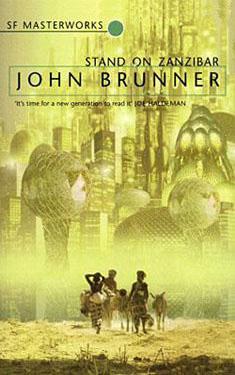Read 3/2013, reviewed 4/13/2013, revised 10/18/2013
3 stars
I had a tough time with this book. I spent the first third of the book figuring
out the structure and keeping the characters straight. This was far too long for me. During this time, I struggled to simply pick
up the book.
Brunner described it as a “non-novel,’ which immediately
makes me think that the author is full of himself. “Hey, I’ve written an awesome book that
breaks all the rules! Read me, I’m
important!” This created an initial bias
against the book, and probably accounted for my struggle with it. With its dystopian premise, it felt a little
like I had picked up some hip ‘60s mishmash of Brave New World and Future
Shock. It didn’t feel like fiction, and
felt pretty sterile. I guess that’s why
Brunner used the term “non-novel.”
By the time I got to the middle of the book, everything
began to come together. I became less
distracted by the non-Continuity chapters, i.e., the chapters that did not
advance the plot, and actually got how they provided the appropriate contexts, subplots,
and general feel of the society. The
major plot lines had become more interesting as well. Initially, it seemed to take a long time for
the setup. I couldn’t figure out why I
needed to care about the major characters, but by the middle of the book, I
did. I liked Norman and Donald.
There’s one thing about the character of Chad Mulligan. He reminded me of the near-divine characters of Heinlein: Jubal Harshaw
and Professor de la Paz. When he’s
introduced, he comes off as a bit too omniscient and compassionate. Granted, we get a taste of his amazing
insight and popularity throughout the book, but when we meet him, he just too
easily lives up to his hype.
I devoured the second half of the book. I was glad I read it. I still only give it three stars because of my
difficulty in getting used to it. I’m
not averse to “playing with form,” but this was tough. I feel like I missed out on enjoying the beginning
of the book because of it. I still
highly recommend reading it, at the very least because of the form. I think everyone should experience a shake-up
of the norm. This book made me
interested in reading a similarly unconventional novel, House of Leaves.

No comments:
Post a Comment